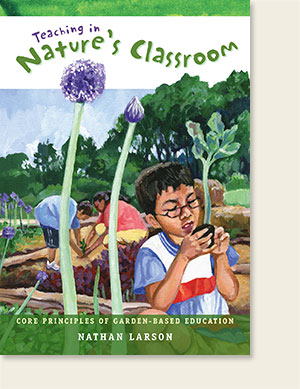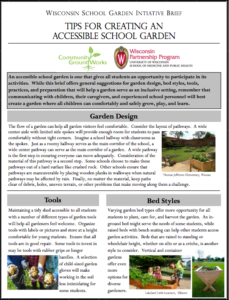 An accessible school garden is one that gives all students an opportunity to participate in its activities. While this brief offers general suggestions for garden design, bed styles, tools, practices, and preparation that will help a garden serve as an inclusive setting, remember that communicating with children, their caregivers, and experienced school personnel will best create a garden where all children can comfortably and safely grow, play, and learn. Download Brief »
An accessible school garden is one that gives all students an opportunity to participate in its activities. While this brief offers general suggestions for garden design, bed styles, tools, practices, and preparation that will help a garden serve as an inclusive setting, remember that communicating with children, their caregivers, and experienced school personnel will best create a garden where all children can comfortably and safely grow, play, and learn. Download Brief »
Supporting Youth Gardens with Master Gardener Volunteers
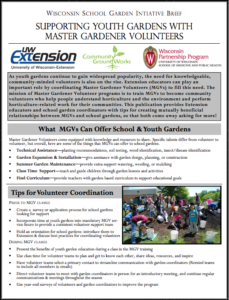 As youth gardens continue to gain widespread popularity, the need for knowledgeable, community-minded volunteers is also on the rise. Extension educators can play an important role by coordinating Master Gardener Volunteers (MGVs) to fill this need. The mission of Master Gardener Volunteer programs is to train MGVs to become community volunteers who help people understand horticulture and the environment and perform horticulture-related work for their communities. This publication provides Extension educators and school garden coordinators with tips for creating mutually beneficial relationships between MGVs and school gardens, so that both come away asking for more! Download Brief »
As youth gardens continue to gain widespread popularity, the need for knowledgeable, community-minded volunteers is also on the rise. Extension educators can play an important role by coordinating Master Gardener Volunteers (MGVs) to fill this need. The mission of Master Gardener Volunteer programs is to train MGVs to become community volunteers who help people understand horticulture and the environment and perform horticulture-related work for their communities. This publication provides Extension educators and school garden coordinators with tips for creating mutually beneficial relationships between MGVs and school gardens, so that both come away asking for more! Download Brief »
Telling Your Garden Story
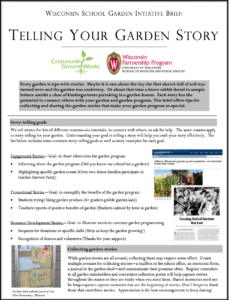 Every garden is ripe with stories. Maybe it is one about the day the first shovel-full of soil was turned over and the garden was underway. Or about that time a brave rabbit dared to sample lettuce amidst a class of kindergartners partaking in a garden lesson. Each story has the potential to connect others with your garden and garden program. This brief offers tips for collecting and sharing the garden stories that make your garden program so special. Download Brief »
Every garden is ripe with stories. Maybe it is one about the day the first shovel-full of soil was turned over and the garden was underway. Or about that time a brave rabbit dared to sample lettuce amidst a class of kindergartners partaking in a garden lesson. Each story has the potential to connect others with your garden and garden program. This brief offers tips for collecting and sharing the garden stories that make your garden program so special. Download Brief »
Sowing the Seeds of Success
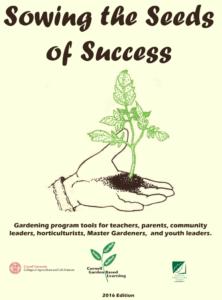 Designed in partnership with the American Horticultural Society, Cornell University’s Sowing the Seeds of Success is designed to walk you through the organizational aspects of a gardening program, including planning & organizing, benefits & research, fundraising & promotion, and evaluation. View Resource »
Designed in partnership with the American Horticultural Society, Cornell University’s Sowing the Seeds of Success is designed to walk you through the organizational aspects of a gardening program, including planning & organizing, benefits & research, fundraising & promotion, and evaluation. View Resource »
Teaching In Nature’s Classroom
In Teaching in Nature’s Classroom: Core Principles of Garden-Based Education, Nathan Larson shares a philosophy of teaching in the garden. Rooted in years of experience and supported by research, Larson presents fifteen guiding principles of garden-based education. These principles and best practices are illustrated through engaging stories from the field. The book also features a collection of vivid paintings by mural artist Becky Redelings and connections to the research literature provided by Alex Wells and Sam Dennis of the University of Wisconsin Environmental Design Lab.
We are excited to be able to offer copies of Teaching in Nature’s Classroom in both English and Spanish, free of charge! Visit the book website to receive a free copy.
